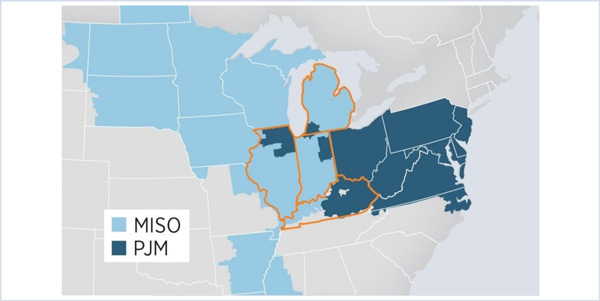By Amanda Durish Cook
MISO and PJM will submit new filings with FERC in response to a second deficiency letter regarding their pseudo-tie coordination efforts.
The commission’s deficiency letter seeks clarification on a proposed joint operating agreement revision that would allow the RTOs to terminate or suspend pseudo-ties that don’t acquire transmission service or follow modeling rules (ER17-2220). The language gives a native balancing authority the ability to redirect pseudo-tie output to avoid exceeding NERC operating limits. (See MISO, PJM Float Pseudo-Tie Coordination Plan.) PJM’s matching proposal triggered an identical deficiency letter (ER17-2218).
FERC’s lingering questions include how and under what circumstances a native reliability coordinator would commit, de-commit or redispatch pseudo-tied generation to avoid exceeding system operating limits or interconnection reliability operating limits, features both RTOs say would be beneficial for maintaining reliability. The commission also asked the RTOs to clarify what constitutes a pseudo-tie suspension and delineate the grounds for such suspensions. It also seeks clarity on the rationale behind the 42-month notice to terminate a PJM pseudo-tie, all the possible grounds for termination and what process will be in place to handle contested terminations. The RTOs have until Oct. 28 to respond.
MISO will be working internally and with PJM to draft a response to the deficiency letter, MISO Director of Market Engineering Kim Sperry said at an Oct. 5 Reliability Subcommittee meeting. She provided no other details. MISO and PJM introduced the coordination efforts in early July.
The most recent letter comes five months after the RTOs received a deficiency notice on their pseudo-tie pro forma agreement. The pro forma has since been approved by FERC staff, but the commission ― which has since gained a quorum ― could overturn that approval. (See FERC Conditionally OKs MISO’s Pseudo-tie Pro Forma.)
MISO’s Independent Market Monitor has protested the new JOA language, saying “nothing in the filing ameliorates the myriad significant problems caused by the pseudo ties.” For more than a year, Monitor David Patton has called for the complete elimination of pseudo-ties, arguing that the process produces dispatch and reliability risks along with expensive congestion that is difficult to manage.





